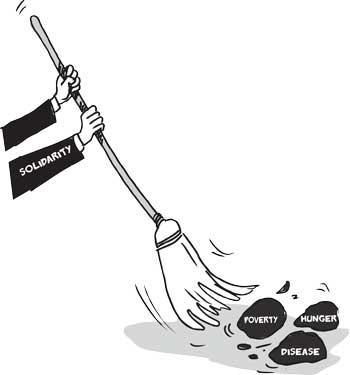Reply To:
Name - Reply Comment
Amid intensified moves to consolidate an inter-religious solidarity alliance to bring about a just society, lasting peace and reconciliation in Sri Lanka, the United Nations yesterday marked the International Human Solidarity Day.
In a statement the world body says the sustainable development agenda is centred on people and the planet, underpinned by human rights and supported by a global partnership determined to lift people out of poverty, hunger and disease. It will, thus, be built on a foundation of global cooperation and solidarity.

According to the UN, it was a day to celebrate our unity in diversity, a day to remind governments to respect their commitments to international agreements, a day to raise public awareness of the importance of solidarity, a day to encourage dialogue on the ways to promote solidarity for the achievement of the sustainable development goals including poverty eradication and a day of action to encourage new initiatives for poverty eradication.
In the Millennium Declaration, solidarity is identified as one of the fundamental values of international relations in the 21st century, wherein those, who either suffer or benefit least deserve help from those who benefit most. Consequently, in the context of globalization and the challenge of growing inequality, strengthening of international solidarity is indispensable. Therefore, the UN General Assembly, convinced that the promotion of the culture of solidarity and the spirit of sharing is important for combating poverty, proclaimed December 20 as International Human Solidarity Day, the UN says.
Through initiatives such as the establishment of the World Solidarity Fund to eradicate poverty and the proclamation of International Human Solidarity Day, the concept of solidarity was promoted as crucial in the fight against poverty and in the involvement of relevant stakeholders, the UN stresses.
The concept of solidarity has defined the work of the UN since the birth of the organization. The UN’s creation drew the peoples and nations of the world together to promote peace, human rights and social and economic development. The organization was founded on the basic premise of unity and harmony among its members, expressed in the concept of collective security that relies on the solidarity of its members to unite to maintain international peace and security.
It is in the spirit of solidarity that the Organization relies on cooperation in solving international problems of an economic, social, cultural or humanitarian character.
According to the UN Department of Economic and Social Affairs, the sustainable development goals report issued in October this year paints a mixed picture of global progress on extreme poverty eradication. On the one hand, global poverty rates, measured as the proportion of people living below the US$1.90 a day international poverty line, have continued to decline. In 2018, an estimated 8.6 per cent of the world’s population was living in extreme poverty, down from about 28 per cent in 2000 and 16 per cent in 2010. Much of this decline is due to the rapid progress achieved in East Asia and South Asia. China has virtually eliminated extreme poverty over the past three decades, while India has also made great strides, particularly since the early 2000s. On the other hand, global progress has been highly uneven. In sub-Saharan Africa, more than 40 per cent of the people are still living on less than US$1.90 a day and the total number of extremely poor people is significantly higher today than it was two decades ago. Worryingly, the pace of progress in eradicating poverty has notably slowed in recent years. According to UN DESA estimates as of May 2019, the number of people living in extreme poverty has risen in several sub-Saharan African countries, where poverty levels are already very high.
In Sri Lanka also the new government needs to give high priority to poverty alleviation or eradication because if that does not happen, millions of people will not be able or willing to take part in other important issues such as sustainable eco-friendly economic development, the battle against global warming and the concept of peaceful conflict resolution through dialogue instead of war or violence.